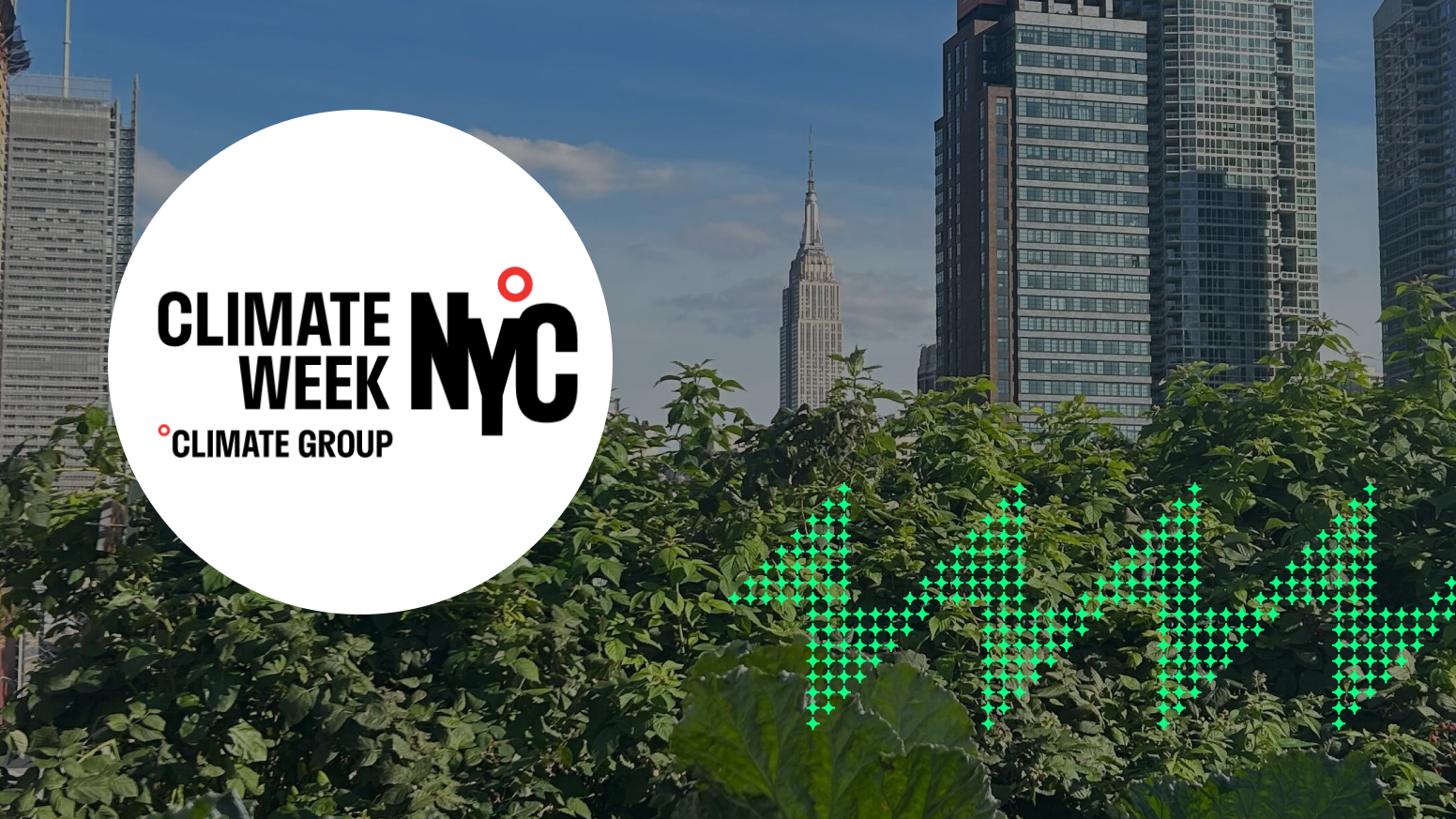Policy reflections from an inspiring Climate Week NYC

Climate Week NYC just wrapped last Friday and with over 250 events taking place all over the city, there was quite a lot of ground to cover. Fortunately, I like bopping around — so I tried my best to take in as much as I could about how fellow climate tech enthusiasts are thinking about the clean energy future. (And I got to meet some cool people along the way.)
I’m Austin Perea, and as Arcadia’s Senior Policy Manager, I lead our state-level policy and regulatory affairs in the Northeast. Along with a cross-functional team of Arcadians, I joined sessions all week long to get a pulse on how a wide range of stakeholders — from policymakers to scientists to CEOs and everyone in between — are taking action on climate.
Throughout the week, I noticed a few key themes emerging across the week’s all-encompassing set of panels, discussions, and happy hours. After an exciting (and yes, tiring) five days, these are the big trends we’re thinking about at Arcadia as we look ahead to 2024 and beyond.
The Inflation Reduction Act has unlocked massive opportunities for the entire industry. Carbon capture and sequestration. Green hydrogen. Geothermal networks. Electrification. Across every sector, Climate Week was abuzz with companies, investors, and policymakers discussing the opportunities that the IRA is enabling for the clean energy transition. Here at Arcadia, our technology is built to power that transition — so we’re well-suited to serve the many businesses and individuals benefiting from this landmark legislation. For instance…
- Our community solar program is maximizing the potential of community solar to help people save on their utility bills (with a particular focus on low- and moderate-income customers) while also helping decarbonize the grid.
- Our Arc data platform unlocks access to comprehensive utility data, analytics, and more — helping a wide range of businesses including DERs (Distributed Energy Resources) advance their use of energy data to unlock new opportunities.
In the post-IRA world, policy is a “critical business function” for climate tech companies across the spectrum of size and funding levels. We just zoomed by the one-year anniversary of the IRA passage and in many ways, the policy work across the industry is just getting started. According to panelists at the New Climate Future’s panel Fit for Purpose: Climate Policy for Early-Stage Tech Developers, climate tech companies should invest in policy teams to ensure they’re best equipped to operate within this new landscape while helping to create brand new market rules. Arcadia is no stranger to this level of engagement, as our policy team has actively been working with the federal government on IRA implementation for several new programs…
- 20% Low-Income Economic Benefits credit. Since the passage of the IRA, our team has been engaged in an ongoing rulemaking process led by the US Treasury Department and the Internal Revenue Service. Specifically, we’ve been advocating for program rules that ensure community solar is well-poised to capitalize on the 1.8 GW of capacity that will soon be available for LMI customers, both in state markets with and without existing community solar programs.
- HOMES Act Implementation. Our team has also worked with the Department of Energy to ensure another key piece of IRA implementation is well-crafted: Rebates for home energy retrofits. The newly announced HOMES Act is innovative because the program’s rebates are dependent on how much energy is saved in a building compared to its historic usage. Arcadia’s data platform is purpose-built to deliver this usage data for measurement and verification. The HOMES Act also requires data providers to have robust cybersecurity practices in place, which is aligned with policies we’ve been advocating for several years. For instance, in our regulatory comments to the New York Public Service Commission, we urged regulators to require third-party community solar providers to obtain SOC 2 certification in order to strengthen industry standards to protect sensitive customer data.
Finally, state- and local-level policymakers have a huge part to play in the IRA’s success. While the federal government is a critical stakeholder, panelists unanimously agreed that state-level policymakers have an enormous role to play in determining how individual states will benefit from IRA implementation. This is precisely why Arcadia’s policy team spends so much of our time engaged on the state and local levels. One area we’re particularly focused on is engaging state energy offices on their applications to the Environmental Protection Agency for grant funding.
- EPA Solar for All Grant: A big area of opportunity for community solar is in the EPA’s Solar for All funding opportunity, where the EPA will award up to $7 billion to states to expand solar energy access to low-income and disadvantaged communities. For Arcadia, our policy position is a no-brainer: States should be building off the success of state-level community solar programs by requiring minimum LMI requirements for community solar projects that receive Solar for All grant funding. This will help ensure that community solar isn’t just decarbonizing the grid, but also meeting climate justice goals by reducing the energy burden for folks living in disadvantaged communities. Given the clear benefits of community solar for LMI customers and distinct structural advantages over residential solar (crucially, you don’t need to own a home to take part) state energy offices would be wise to adopt Arcadia’s recommendations.
The whole week was a whirlwind, and its rapid pace matched that of the growing movement in the US to electrify and decarbonize. I’m excited to keep working on that clean energy future here at Arcadia, and am already looking ahead to seeing the progress we’ve made right back here in NYC in 2024.

Clockwise, from top-left: That’s me at the Electric Happy Hour (photo credit: Luke Liu) hosted by Canary Media and Rewiring America, my colleagues Helena Kilburn and Eleanor Parry at the Marketplace of the Future, and a mainstage session at The Nest Climate Campus.


